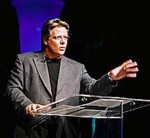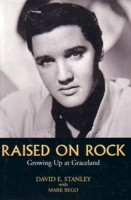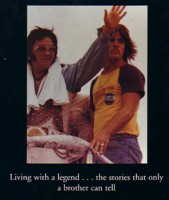Interview:
David Stanley
|
David
Edward Stanley is the youngest of Elvis' three stepbrothers
who came to live in Graceland in 1960.
David
is a renowned public speaker and motivator whose Solutionary
Dynamics programs has helped many people improve their
lives.
|
 |
As
an author David has written four books about his life with Elvis:
- Elvis
We Love You Tender
- Life
With Elvis
- Raised
On Rock
- The
Elvis Encyclopedia.
With
news of David's first feature film, The
Headhunter, EIN caught up with him again to discuss
the film and Elvis. As always, David Stanley speaks openly
and enthusiastically about his life and projects.
In
this interview he shares more about his life with Elvis and
gives us some insights into what to expect from The Headhunter,
including describing powerful scenes from the film.
Hi
David, fantastic to talk with you again. Since we last talked
it has been a very busy time for you and we expect a very
exciting time with the announcement of your first feature
film The Headhunter.
EIN:
David, how did the idea for The Headhunter come about?
DS:
I love movies. Elvis loved movies. I grew up on films. I fell
asleep so many times at the Malco Theater in Memphis. So I've
always had a fascination with the movies. I've had the idea
for a film for about 20 years, and about one-and-a-half years
ago I crystallized my concept for what would be a very interesting
film - a boy at high school one day, bodyguard to the world's
biggest superstar the next!
In
fact I have ideas for three films: The Headhunter, Restoring
My Father's Honor, and Predator in The Pulpit. The Headhunter
is the first of the three to be filmed.
(EIN
note: synopses of David's other planned films appear at the
end of this interview)
EIN:
Please tell us about the storyline to The Headhunter?
DS:
First of all I must stress The Headhunter is not a film about
Elvis Presley. It is the story about David Stanley and his
relationship with Elvis Presley. It is very much about David
Stanley on and off the road with Elvis….the end of innocence.
I became the youngest bodyguard in rock and roll history to
its biggest star. I had to protect Elvis against everything.
The only thing I couldn't protect him against was himself.
The
film covers the period 1972 to 1977, the years that I worked
for Elvis.
1972
was such a big year. As a 16-year-old I started working for
Elvis in June that year. I was there for the Madison Square
Garden concerts, Vegas and then in 1973 what is probably the
most famous concert in history, Aloha From Hawaii.
EIN:
David, it is interesting that you have chosen the 1972-1977
period as the focus for most of The Headhunter. It is a period
most filmmakers avoid, as it was the time of Elvis' decline.
DS:
That's a good point. I chose that period because it is the
time that I worked for Elvis. You know, those few years were
certainly when Elvis' personal problems took over his life.
It was a personal decline, not a professional decline. Medications
took on a big role in his life and it is something I reflect
on…that I was Elvis' bodyguard but I couldn't save him from
himself.
The
Headhunter gives me the opportunity to tell the world about
the Elvis I knew and loved.
EIN:
While the film is your story and not a story about Elvis Presley,
obviously your life's course has been instrumentally affected
and directed by Elvis' influence. It must therefore be difficult
to maintain an effective balance between the two issues. What
would you say to this observation and on a related issue,
how will The Headhunter be different from other films with
an Elvis theme?
| DS:
As I said before, The Headhunter is really the David Stanley
story. While we will show Elvis going on and coming off
stage there won't be scenes of him performing on stage.
There won't be any Elvis music. It is the relationship
we want to emphasise. It's a bit like watching the Titanic.
We know the story of the ship, but until the movie we
didn't know the Jack and Rose story. Similarly we know
the Elvis Presley story but the Elvis and David Stanley
story is not well known. |
 |
It's
a true story about what it was like for me at the age of sixteen
to be plunged into the surrealistic, self-destructive world
of an international icon. An icon who was also my big brother,
surrogate father, mentor and friend. As it is about the David
Stanley story, it will be quite different other films involving
Elvis.
EIN:
What else can you tell us about The Headhunter?
DS:
There will be many powerful scenes in the film. The opening
scene takes place in 1960 at the dinner table in Graceland.
Four lawyers are there and my father, Sergeant William Stanley,
is being asked to sign papers.
"If
you ever want to see your boys again you'll sign it."
He
pauses and says "You've taken everything else but you can't
take that!"
The
small face of four-year-old David Stanley is seen looking
out a window as Elvis arrives in his Army uniform.
My
biological father, who had fought Hitler and served in the
Korean War, had just lost a battle. His loss would be my gain!
We
then use a morphed scene to convey meaning: The first time
Elvis sees me he comments, "Man he's a big one".
After
he picks me up I rub the soldier's stripes on his uniform
and look up. I see my father who says "Son, this is one battle
I didn't win".
I
look at him again and this time it's Elvis that I see.
One
of my other planned films, Restoring My Father's Honor, is
about my biological father and the hurt that was done to him.
But you know, at Graceland, Elvis was more of a father to
me than Vernon was.
In
The Headhunter, the first 12 years of my life will be covered
real fast, using a narration format.
EIN:
How did you come to get the nickname, The Headhunter?
DS:
Elvis gave it to me. One day during a karate workout someone
commented to Elvis about me. Elvis replied that I was his
youngest brother, David Stanley, calling me "the Headhunter".
The name stuck.
EIN:
The film is currently in pre-production. When is filming likely
to commence?
DS:
Yes we are in pre-production right now. In fact we finished
the script last week. I wrote it with two very experienced
scriptwriters, Marty Poole and Dean Daniels. It took us a
year to do, with revision after revision, but we now have
an advanced draft. We expect to start rolling the cameras
in late fall, late November or early December, mid-January
at the latest.
EIN:
Have any casting decisions been made yet? In particular, many
fans will be very interested in who might play the part of
Elvis.
 |
DS:
We have a shortlist of actors who we'd like to play
my character and also a shortlist for the character
named Katie.
Because
the role of Elvis Presley will not be a feature part
of the film we are yet to consider casting choices for
"Elvis". We are not looking for a 'high collar, sideburn,
on stage' image or impersonator. There was only one
Elvis Presley and we can't duplicate him.
|
The
challenge is to find someone who is a really good communicator,
someone with a powerful on stage presence. So I'm really holding
off on that casting process. In all likelihood it will not
be a huge star like Johnny Depp or Nic Cage.
EIN:
Will you be appearing in the film?
DS:
Maybe a cameo, I'm not sure at this stage. I might just appear
in a walk by situation.
EIN:
Like the Hitchcock device.
DS:
(laughs) yes, it could be like that.
EIN:
Is The Headhunter your first experience with filmmaking?
DS:
It's my first experience with the movie process. I've worked
on several documentaries in the past including Legacy of the
Legend released in 1994 and another one with Lamar Fike. As
part of my college studies I completed a minor in film production
so I have a relevant background.
EIN:
How are you finding it?
DS:
It is very exciting. I'm directing the film because I know
the story well and as a speaker and motivator I think I can
pull out the best in the characters. I have a strong vision
of what is needed. I want to capture the "look", the "feel",
the "dress", the "language", the "lighting", the "mood". The
challenge is up to me. It's a big responsibility but I've
never been afraid of taking responsibility. And our investors
believe in me.
I
am surrounding myself with some of the best in the business,
a seasoned line director, a highly regarded director of photography.
And when you get together with these top people and have a
strong sense of vision and purpose, all this magic happens.
The 'key' to The Headhunter's success will be our ability
to work within its $5m budget.
EIN:
David, on the matter of money, how is the Headhunter being
financed?
DS:
The film is a totally independent undertaking, both its production
and financing. As I said we have secured a budget of $5m.
Our backers have been very positive about the premise of The
Headhunter. They like that it is not just another film about
Elvis. They like that it is a human interest story.
EIN:
When can we expect to see The Headhunter released?
DS:
The Headhunter should be released in late fall 2005.
EIN:
Is the Impello Films website the best way for fans to keep
up-to-date on the film's progress?
DS:
Yes it's a great place for information. It's a great site
developed by an associate from Dellaplaine Creative. You can
subscribe to our monthly newsletter on the site. It will keep
you updated as the film develops. In the next week or so we
will be adding some major news about how The Headhunter is
progressing.
EIN:
David, you are scheduled to appear on Larry King Live on August
16. Given the significance of that date what can viewers expect
from your appearance on the show?
DS:
I filmed the Larry King segment last week. My brother Ricky,
Joe Esposito and Barbara Eden were also part of the interview.
Larry King is a friend. I did a similar segment on his show
last year and he asked if I'd do another one again this year.
He is a big Elvis fan…he's fascinated about Elvis' continued
impact on the world. The segment is really a group of friends
"hanging out" talking about Elvis. It's a bit like "Hey, do
you remember when....do you remember this and that…". It's
a celebration of Elvis' life.
EIN:
Do you have any other promotional appearances planned in the
coming months?
DS:
I don't have anything planned at this point in time. I imagine
that I'll be asked to do some media interviews next week during
Elvis Week. We'll be doing a promo for the film next year.
EIN:
David, Solutionary Dynamics. I know from responses to our
earlier interview with you that there was a lot of interest
in your motivational program. What is its future now that
you are involved with Impello Films Inc and The Headhunter?
DS:
I still do Solutionary Dynamics. About six times a year I
address a group of people in LA and the results are amazing.
I love speaking and I really like helping people. However,
because of my work with The Headhunter I haven't been able
to produce a DVD edition of the Solutionary Dynamics program,
nor write a book version. They are simply "on hold" at the
moment.
Both
the DVD and book will come out at sometime in the future.
The reality is that I am now practicing what I'm teaching
others. Making The Headhunter is fulfilling my dream of bringing
my story with Elvis to film. I'm applying my Solutionary Dynamics
principles, rather than just talking about them.
EIN:
Have you had an opportunity to watch the new deluxe DVD releases
'68 Comeback Special and Aloha From Hawaii? And if yes, what
memories did they bring back?
DS:
I have watched Aloha. It's a great release and brings back
many positive memories. It was such a monumental concert,
a piece of history that will remain with us for the rest of
our lives. And obviously I love that concert because I was
actually there!
I
had my sons over the other week, one's 18 years and about
to go to uni in Waco, while the other one's 21 years. I remember
my 18 year-old saying "I'm going to college". I
pointed to this cool footage of me as walking beside Elvis'
jeep in Aloha and said "That's what I was doing at your age".
It's so surreal yet so real.
EIN:
If Elvis was alive today what would he be doing?
DS:
You know I remember Joe Esposito answering this question.
Joe said if Elvis was alive today he'd probably be directing
films. I agree with Joe.
EIN:
David, a personal question. I was just wondering if you ever
reflect on how your life might have been had you not become
youngest brother to Elvis? What would David Stanley possibly
be doing now had his life been different?
DS:
That's a hard question. You know my biological father was
a strong disciplinarian. As an Army man he fought in Normandy
and Korea. He was a 19-years career soldier. I think I probably
would have finished school and joined the service rather than
getting into entertainment. My Dad also liked training dogs
and hospital administration so you never know. However my
mind was so shaped by being around Elvis.
EIN:
In your books about growing up around Elvis you have been
very candid about the highs and lows in your life. How do
you view the bad times today?
DS:
I think I told you this last time we spoke, but writing Raised
On Rock was a cathartic experience for me. I was able to reveal
the grand façade of how my life had become. Like Elvis there
was no accountability and in the end it took his life. I was
lucky I was able to reverse my self-destructive path.
I
really want to stress here that while there was a negative
ideology of being with Elvis, I in no way blame Elvis.
He was, and still is a great man. We are what we are brought
up to be and how conditions unfold around us. Each of us has
our strengths and weaknesses.
Elvis
gave and gave and didn't take care of himself. I did the same
thing for a long time. How I lived my life was not Elvis'
fault. I had choices and for a while I chose the wrong ones.
I
wouldn't trade my days with Elvis for anything. Today, I look
back smiling at the many, many good times, and knowing that
despite the negative times I learned from my experience. Like
Elvis I spiraled into a cycle of sex and drugs. It caused
me to have an affair, it destroyed my marriage. But my experience
helped shape who I am today.
I
hope I will be seen as an accomplished filmmaker, an accomplished
speaker and author. And at the end of the day I can look back
and say I'll always be Elvis Presley's brother. That could
be a good inscription for my tombstone.
EIN:
Is there anything you would change about your life?
DS:
I wouldn't swap my life for anything. If I could do it over
again I might do it a little differently but those years growing
up around and working for Elvis were wonderful, exciting times.
EIN:
David, I've asked you this before, but why is Elvis so revered?
DS:
I think my brother Ricky got it right. He once said "Elvis
personified cool". That's as good an answer as any.
David,
as always, it has been a great pleasure talking with you.
Like many fans, we at EIN look forward to the release of The
Headhunter and hopefully we can talk to you again around that
time.
David
Stanley was interviewed by Nigel Patterson on 5 August (Texas
time)
Visit
the Impello Films website
Read
EIN's interview with David in 2003
About
David Stanley's other planned films
Restoring
My Father's Honor: Restoring My Father's Honor is the
true and untold story of Sgt. William J. Stanley, a combat
veteran who survived the bloody beaches of Omaha, the carnage
of the Battle of the Bulge and the Chinese intervention of
the Korean War. It is the story of a man who earned the Purple
Heart, Bronze Star and Croix de Guerre for his heroic actions
in combat. The story of a man who knew victory in battle,
only to be felled by the weapons of power, money, greed and
fame.
Predator
in The Pulpit: Predator In The Pulpit is the intriguing
story of a former rock and roller turned to a powerful evangelist
whose story and presence dominates the evangelical platforms
of the 1980's. Trained by the best, he rises to the top of
the evangelical world only to discover that there are more
lies, deceit and greed in his world of evangelism than he
ever knew in the world of his rock and roll past.
Click
to comment on this interview
|



